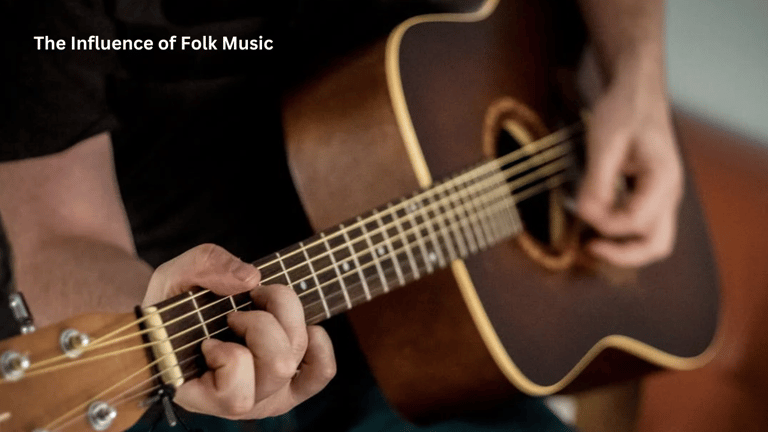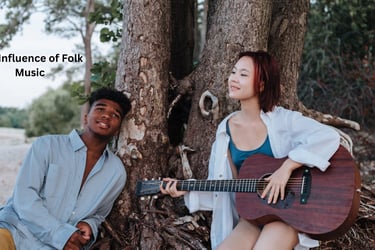The Influence of Folk Music What Is Written About Its Origin
1/15/20256 min read


The Influence of Folk Music: What Is Written About Its Origin
Folk music is not a genre but a background for the soundtrack of the story told of people's lives, describing their sufferings and enjoyment as well as the orientation of values. Born from folk tales of rural communities, folk music would embrace everything except stories and experiences. This power has strayed so far from its folk origins that it even invents new styles of music, for instance, rock, blues, country, or even electronic. Only for this history and theme of folk do we appreciate why it matters to us today. This paper outlines books about folk music and whence it came so a reader may more readily comprehend where this genre resides in history and who wrote this genius masterwork.
1. History and Evolution of Folk Music
Folk music has changed since it was introduced into other incorporations of cultures, history, and changing society. Being older than olden times, folk music itself narrates as a tool that keeps stories about culture and manifestations of values of the local community in memory.
What Makes Folk Music Unique?
• Oral Tradition: Folk music is always entirely local simply because it travels from mouth to mouth to different communities and their histories.
• Cultural Reflection: Folk songs represent the cultures and beliefs of individuals, and people use them to reflect on problems in society.
•Simplicity and Accessibility: Folk music, compared to classical music, has always been simple in form and, hence, less complex for anyone to either perform or listen to.
•There is so much machinery worldwide; however, of all widely used instruments upon which folk noises originate are the guitars, the banjos, fiddles and the flutes.
Folk music was also liked because it was entirely soothing and present in the massive variety of the masses. Most of its compositions, along with their words, contain love, misery, and revolutionism, so everyone cannot reject those at any stage of life.
2. Hurry to Know how Folk Music was Developed and Evolved
As there are so many songs, we should have read through all the books portrayed above that mentioned its development story and the trend of cultural movements worldwide. While I was reading interesting pages on such books as well as other books and related controversy and developments by an author as mentioned below:
The influential folklorist Lomax documented and collected most of these songs over a period of years, representing regional and historic variations of those songs.
Important features
There are more than 200 folk songs.
In what ways was each song so created that the true history regarding forward movement for emphasis of the significance culture of the individual song has been reflected? Just seeing a new nation's pattern is enough to convey an identity related to a particular country.
Why read it
Any interested reader who would like to learn more about the foundation songs that make North American folk music so diverse, this will be your textbook. It makes it easy to fathom how folk music tells an era's societal and political issues.
3. American Roots Music" by Jim Rooney
This is a tremendous primer on reading about some American folk music genres that stretch out this breadth of influence from blues to bluegrass, from Appalachian to country music, as one weaves those influences into such styles. His effort is readable and rather informationally excellent for a writing artist like Rooney. It is informative to follow in-depth solid grounds concerning American music's roots.
Key Features
Explores American Folk Genres.
• Interviews with musicians.
• A book based on the music's cultural, social, and historical background.
Why Read This Book:
Who knows how folk is tied into modern music genres? They should read Rooney's book. In the narration he provides, there's further depth about how race, culture, and identity are connected through the music history of the United States of America.
4. The Ballad of America: The Story of the Folk Songs of the United States by A.R. Penck
It explains what an American folk ballad is, how songs help fill out the history of the American experience, and where folk music reached its climax, becoming an outlet to express enlightenment or, in some instances, actions in a greatly racial and biased class-based society.
Key Elements:
Following are the broad overviews of American folk ballads.
Social and Political Orientation of the Folksong
Research on folk ballads, their influence, and their meaning
Why read
The Pink Book accounts for the massive influence played by such people's ballads over this American heritage regarding their history and own culture as well, and so why it ought to be of this class of one on subject music as history through reflection changed over human events
5. Folk Music: A Very Short Introduction by Mark Slobin
Only one book, Folk Music: A Very Short Introduction by Mark Slobin, defines folk music from a holistic viewpoint in productive form worldwide. With quite particular traditions and modes of cognition regarding European, African, Asian, and American practices of folk music, the book provides quite detailed definitions and shows further where its impact takes place in the life of the culture and society and offers answers as well of how that may happen in the modern world.
Key features
History of folk music around the world
• Role played by folk music in this particular world.
• Challenges Folk Music is facing through this electronic generation.
Why Read This:
This would best fit Slobin's work for any reader looking for a comprehensive overview and insight into folk music. This text avers that varied folk traditions can be seen, and more importantly, their pertinence and relevance to the people of this 21st century.
6. The Emergence of Folk Music Movement by Archie Green
Analysis of the Emergence of the Folk Music Movement: An essay on 20th-century folk music revival and how folk music came as a movement to social change during moments of political struggle, labour movement, and civil rights, among other movements regarded to be part and parcel of the activist camp.
Key Features
• History of folk music revival of the 20th century
• Folk music and activism or protest
• Main figures of the folk movement: Woody Guthrie and Pete Seeger. Why Read It:
This good book by Green would teach someone how folk music has been an agent of social justice and activist work. This book can be an excellent read for readers interested in the connection between music and politics.
7. Effects of Folk Music on Modern Day Genres
Most forms of modern music that are contemporary nowadays imbue folk influences. Be it indie rock, pop or even country, folk live and breathes right at the heart of all the sounds modern artists have made. Ways folk influence sounds include: -
1. Indie Folk and Neo-Folk
Indie folk is one of the newest fad genres that revive folk music in a new form as presented by artists like Bon Iver, Fleet Foxes, and Iron & Wine. It is represented by folk instrumentation and melody, along with lyric themes.
2. Americana and Country
All under one roof-folk, country, and the blues-straight from the birthplace at the start of traditional folk. This list does not contain too many of the most successful folk artists; there's Johnny Cash, Bob Dylan, and Emmylou Harris, who started creating audiences for folk music long before mainstream country helped build a platform that would give such good opportunities to develop a career for life for any musician in future generations.
3. Impact on Rock and Pop
At various stages of their artist careers, they have scrabbled crumbs from the mountaintop icons of people that made so many oldies in hundreds of thousands of pop and rock bands. One great example of just the mix for a potentially epic sound is heard when folk-rock exploded onto that late 1960s soundscape.
4. The Future of Folk
While electronic and other modern forms of music stand at the core of world music, folk music, according to the trend, merges into other genres that address issues pertinent to general society. A healthy and energized global folk music scene will result in new talent coming into the mainstream while upholding their heritage and innovating in the process. A genre reflecting culture, history, and identity, in the simplest of melodies, a mighty message for the world of music. Be it an old-timer or simply beginning, insight into the root, evolution, and impact of folk music through the books penned in this article. As folk music inspires successive generations of artists, finding stories behind the songs has become imperative because these stories determine our cultural and social environment. The importance of such a study lies in appreciating music as a very important factor that binds people, supports cultural heritage, and provokes change.







